Kevin Clarke
Operetta Research Center
29 October, 2019
They are certainly five magnificent cowboys, but with a twist. The fact that they dance an Offenbach pas de deux in act two is only one of the give-aways (“La valse de rayons”). This production of Die 5 glorreichen Sieben (“The five glorious seven”) at Berlin’s Bar jeder Vernunft – turned into an intimate saloon by set designer Friedrich Eggert – revives the long forgotten art form burlesque in all of its original pre-striptease glory: it offers five star actresses cross-dressed in a bawdy spoof of the Wild West, with recycled music, parodying toxic masculine behavior that seems out of date today but that still fascinates. Which is probably why these emancipated ladies reclaim it for themselves, ending with the song “Save a Horse, Ride a Cowboy.”
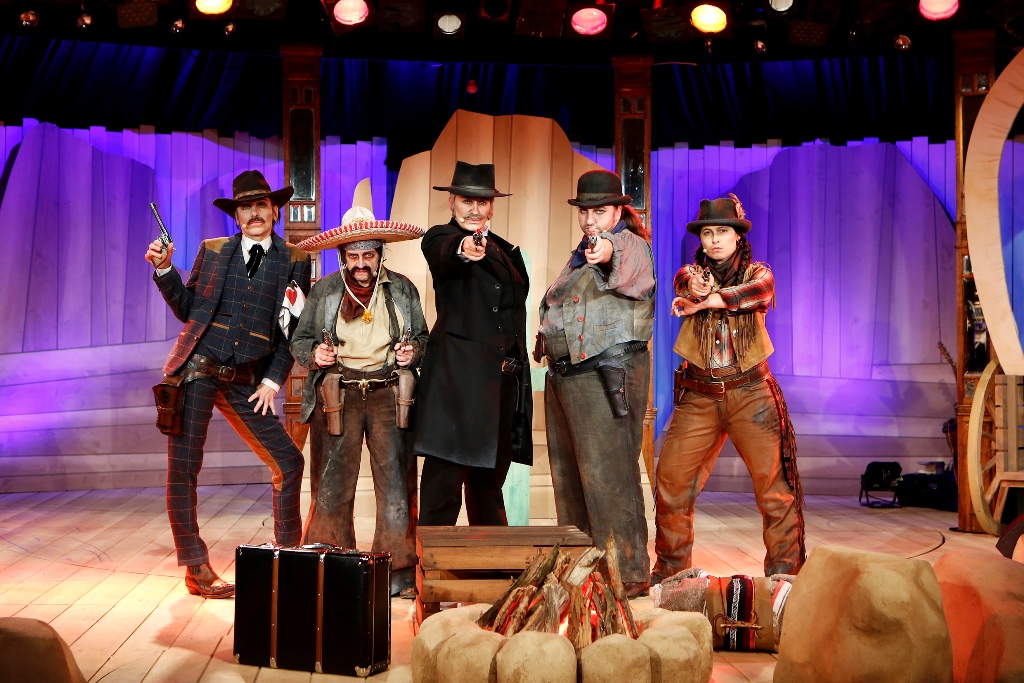
The five stars of “Die 5 glorreichen Sieben”: (left to right) Meret Becker, Katharina Thalbach, Andreja Schneider, Anna Mateur, and Anna Fischer (Photo: Barbara Braun / Bar jeder Vernunft)
You will recall that back in the mid-19th century, parallel to the emergence of operetta, came the boom of burlesque. It conquered the world, using many of the same elements that define operetta: the mocking of classics and the ridiculing of typical bourgeois behavior, the deconstruction of gender norms and a big splash of sexual liberation. But in contrast to operetta, burlesque didn’t use newly composed music but already existing titles. Which is, of course, similar in many ways to Offenbach’s method of re-sampling “types” of music such as French grand opéra, Italian belcanto opera etc. You could say the burlesque method was a little more simple and easier to understand, which is probably why it reached a wider audience back in the day.
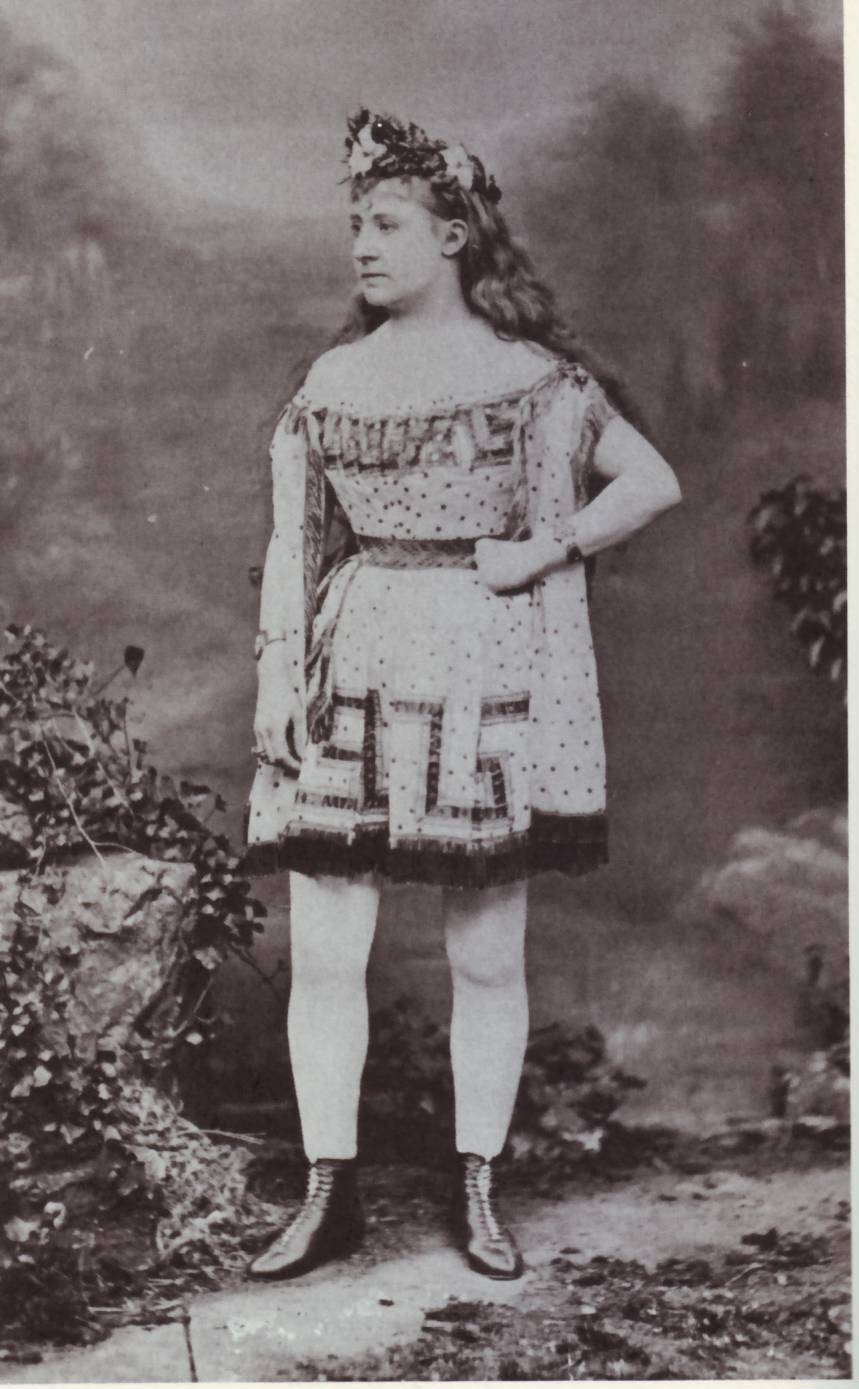
Lydia Thompson as Ixion.
One of the most famous 19th century burlesques was Ixion in which Offenbach’s prima donna Lydia Thompson and her ensemble turned Greek antiquity in its head: in her production all (!) male roles were performed by actresses, and the single female role was given to Thompson’s husband. It was a total gender inversion that created a sensation, first in England, then in the USA.
On The Way To Tombstone
What Thompson did with a Greek myth, Andreja Schneider as author of Die 5 glorreichen Sieben does with the cowboy myth. She creates a story of five men lost somewhere in the desert, on their way to a city called Tombstone, teaming up to hunt down a man who has an “8” tattooed onto his penis and who stole the map of José Piñata (“the laziest pig in Mexico”) that could lead them all to a treasure of gold.
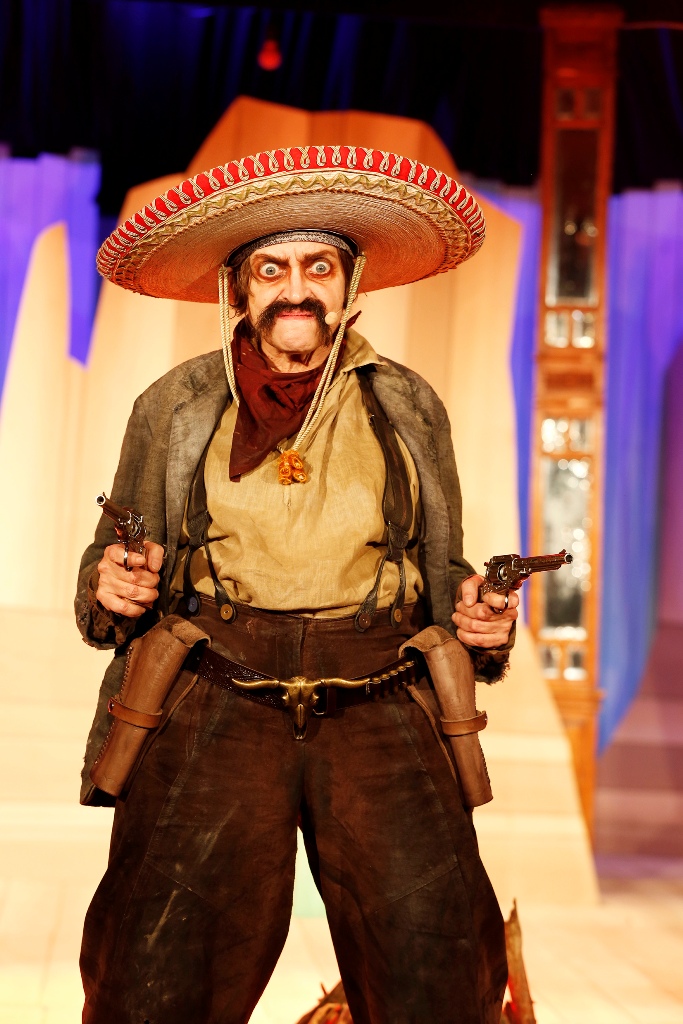
Katharina Thalbach as José Piñata in “Die 5 glorreichen Sieben” (Photo: Barbara Braun / Bar jeder Vernunft)
Sitting around a camp fire next to a cactus, the men share their personal histories with each other and the audience, with numbers such as “Halfbreed” for half-Indian Chico (Anna Fischer) or songs like “Wand’in’ Star” (croaked by Katharina Thalbach as Piñata) from the Lerner & Loewe cowboy operetta Paint Your Wagon. The joy is to see these very well-known actresses, who the audience is mostly familiar with via their German TV and movie careers, as sharply characterized Ur-Typen in the Clint Eastwood and Yul Brynner tradition and deconstructing these archetypes by exaggerating just about everything about them till we realize how idiotic such stereotypes are – and yet how endearing at the same time, in their loneliness, with their longings, with their helplessness that the macho façade can only slightly cover up.
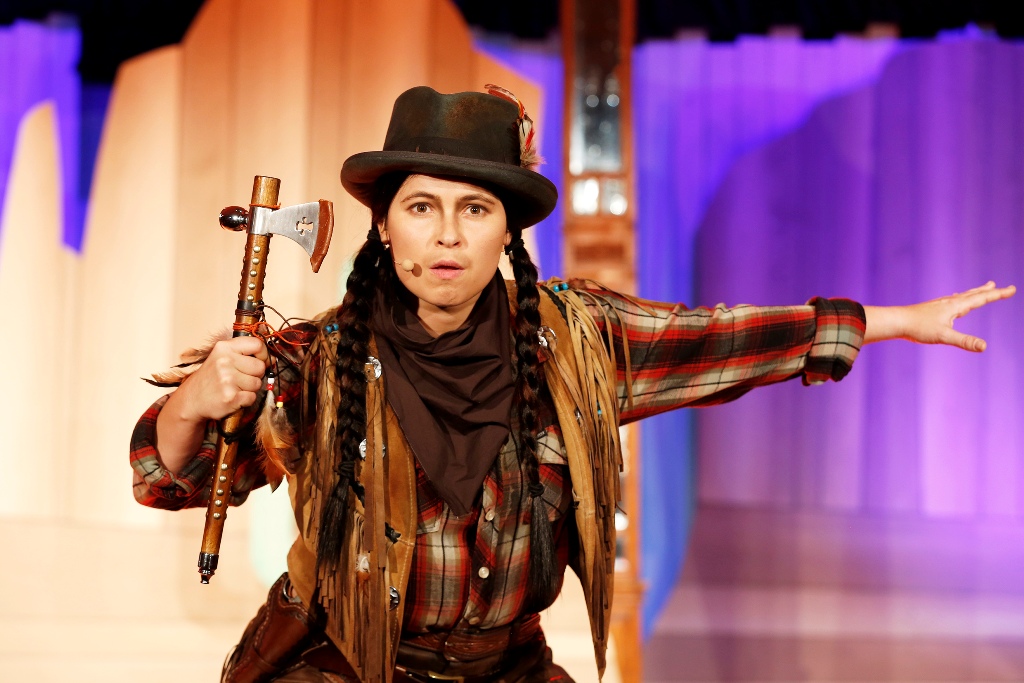
Anna Fischer as the Native American Chico (Photo: Barbara Braun / Bar jeder Vernunft)
Satanic Subversiveness
In reviewing a typical burlesque in the USA back in the 1870s, an American critic called the gender-blurring performance he saw a “horrible prettiness” and described the whole confusing spectacle as “satanic subversiveness.” This verdict could easily be applied to Die 5 glorreichen Sieben. It’s devilish fun to watch these five glorious actresses let loose and enjoy themselves on stage. They don’t need a singing voice for it, because part of the fun is that some of them never actually “sing” a single note, but apply a crazed speaking voice that makes the musical numbers appear all the more outrageous. (Miss Thalbach delivering the Lerner/Loewe number in such a manner is a perfect example, she brings the house down doing it.)
Interestingly, in act 2 the gender-bending is taken one step further than in a usual historic burlesque. Because when the scene opens in a saloon in Tombstone we see the five actresses in typical “girlie” attire as working ladies who are deconstructed just as radically as the cowboys before. In other contexts this would probably be branded as “misogynist,” but that’s the whole point here. It wants to play with stereotypes, it wants to should how laughable they are, it wants to demonstrate that we are beyond them. Die 5 glorreichen Sieben does so, in act 2, with the most shockingly fowl language you can imagine when these sex workers talk “business” and compare experiences.
Playing With Ethnic Stereotypes
Personally, I found this whole over-the-top section the best, because it truly dares to make the audience gasp and grin and think. Which the cowboy section(s) only achieve at times, because some of the dialogue is simply too tame, too predictable, too little provocative. (Unless you’re a social justice warrior, in which case the ethnic clichés shown on stage with regard to Native Americans, Mexicans etc. will really send you off into a tizz; I’m very curious if there will be a shit storm.)
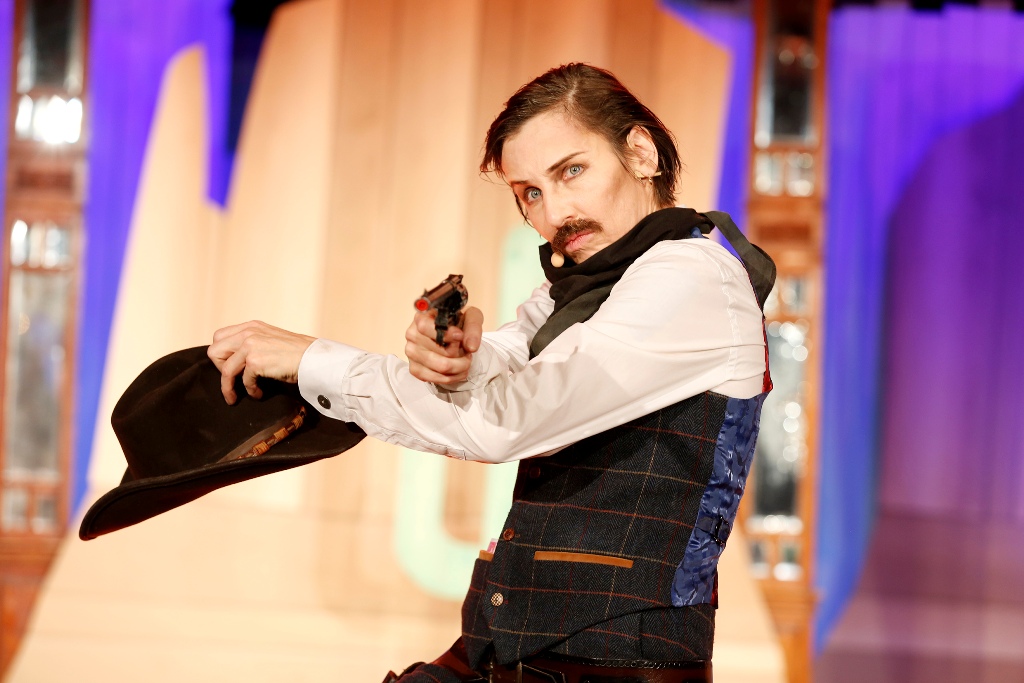
Meret Becker as the gay cowboy Mystery in “Die 5 glorreichen Sieben” (Photo: Barbara Braun / Bar jeder Vernunft)
At the salon, Merit Becker playing a gay cowboy who dresses up as a “madam” and gives Piñata a blow-job, spitting out white liquid afterwards, starts singing “Seeräuberjenny.” Sadly, she only does the verse and never gets to the famous chorus. Which is a pity, because Miss Becker is the most outstanding performer in this production, displaying an agility and elegance (swinging from a rope from the ceiling) that I did not expect. You might remember that Meret Becker was Klärchen back in 1994, in the famous White Horse Inn production at Bar jeder Vernunft. To see her again, now, after she’s become so famous as a crime investigator on German TV in Tatort, is a pleasure. She is a knock-out stage persona and demonstrates that burlesque is definitely her thing.
After the saloon scene, everyone changes back into cowboy gear and the show finishes with a big gun down, at the end of which “8” is dead and carried out in a coffin, his penis hanging out with the tattoo visible, and the glorious five decide to stay together.
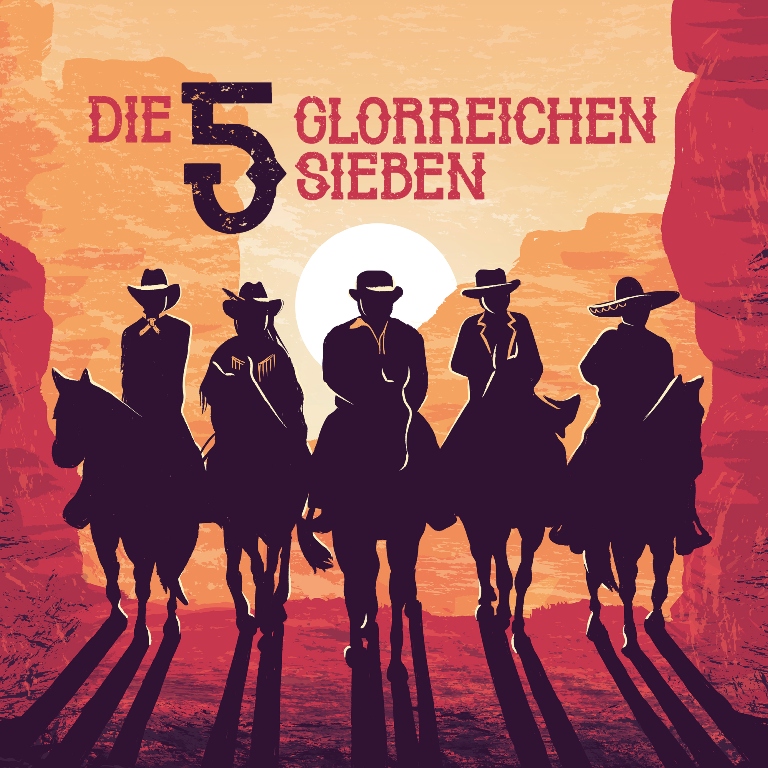
The poster for “Die 5 glorreichen Sieben” at Bar jeder Vernunft (Photo: upstruct.com)
Yes, the script is seriously underwritten, but it works. Because the lusty ladies on stage make it work. They are costumed by Heike Seidler. And the minimalistic sets reminded me of the current Oklahoma production on Broadway which also – in its different way – deconstructs the myth of the Wild West.
As in Oklahoma, the band is a reduced one, led by Ferdinand von Seebach (who recently accompanied Evelin Förster in her operetta program).
Country & Westerns Stars
One opening night quite a few country and western operetta stars were presents that made me think of the many shows one could also play in such a marvelous setting: there was Katharina Mehrling who was such as rousing Arizona Lady at Komische Oper.
There was Christoph Marti was sang similar repertoire as “Ursula West” before venturing onto Clivia and Roxy und ihr Wunderteam. There was Max Raabe, who also starred in Im weißen Rössl in 1994, as did Mr. Marti and his husband Tobias Bonn, not to mention Andreja Schneider.
I hope the current operetta revival lasts long enough for all of them, together or individually, to take on many operetta roles, bringing the madcap burlesque feeling you get in Die 5 glorreichen Sieben to whatever production they might end up in. (And I wish someone would release that Arizona Lady concert performance on CD, especially since Serkan Kaya proved to be such as outstanding cowboy next to Miss Mehrling, deconstructing stereotypes in his own inimitable way.)
The new production at Bar jeder Vernunft runs until 17 November, and amazingly it’s already mostly sold out. Which proves what ideal casting can do. And here Anna Mateur needs to be mentioned, too, who starred in Frau Luna at Tipi am Kanzleramt recently and gives a stand-out performance as Bud Butterfahrt. Of course there’s also Miss Schneider herself as The Reverend.
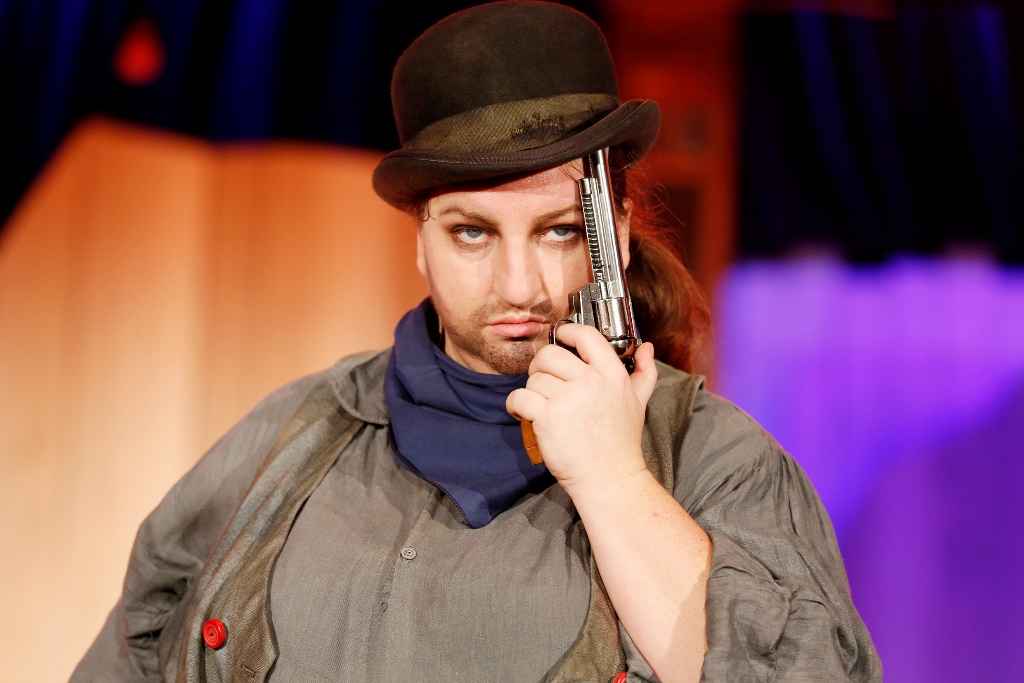
Anna Mateur as Bud Butterfahrt in “Die 5 glorreichen Sieben” (Photo: Barbara Braun / Bar jeder Vernunft)
What Does It Mean To Be A Man?
In his book on burlesque Robert C. Allen writes, “Burlesque is emblematic of the way that popular entertainment becomes an arena for ‘acting out’ cultural contradictions and even contestations and is exemplary of the complexities and ambiguities of this process. It is of particular historical import because its organizing problematic is gender. It emerges at a time when the question ‘What does it mean to be a women?’ is constantly being asked in a wide range of forums and answered by many different, conflicting voices.”
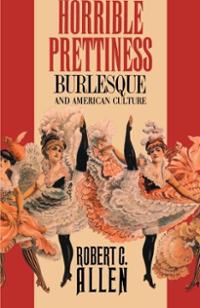
The cover of Robert C. Allen’s “Horrible Prettiness”.
The fact that burlesque – in such a classic form – resurfaces now, in an age when many ask “What does it mean to be a man?” and do we need the categories of “male” and “female” at all, shows that the genre hasn’t lost its poignancy. You might even argue that the revival of operetta in the spirit of burlesque – think of the recent Clivia and Roxy and Eine Frau, die weiß, was sie will or Ball im Savoy – has a lot to do with this. It catapults the genre forward and into the center of hotly debated social issues.

Andreja Schneider as The Reverend in “Die 5 glorreichen Sieben” (Photo: Barbara Braun / Bar jeder Vernunft)
Musically speaking, Arizona Lady and Oklahoma (and Paint Your Wagon or Rose Marie) are the far better cowboy shows. But in terms of capturing the Zeitgeist, Die 5 glorreichen Sieben is absolutely perfect. And that makes it so worth watching. The five leading ladies, plus the wonderful sets by Mr. Eggerth, do the rest. No wonder it sold out right away. Try to catch it, if you can. And, yes, the Offenbach pas de deux is marvelous!
For more information, tickets and performance dates, click here.
